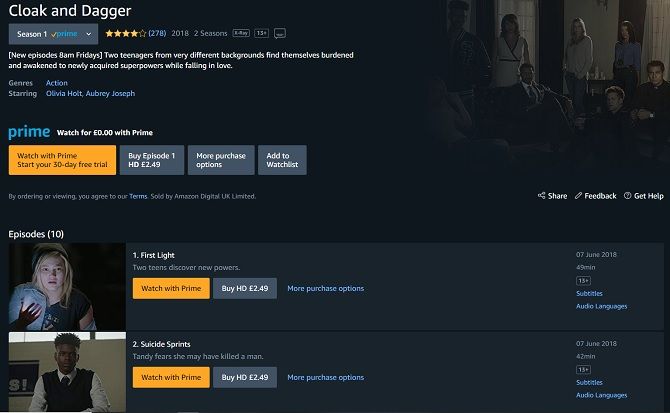Is binge-watching good or bad for you?
As you settle yourself into the couch and enjoy the Game of Thrones boxset for the umpteenth time, that question might go through your mind. Binge-watching definitely has its advantages, but are these outweighed by the disadvantages of binge-watching?
Even streaming services have decided to release some series, like Star Trek: Picard and Star Wars: The Mandalorian, weekly. If companies such as Netflix and Amazon are moving away from dropping whole seasons at once, should you stop binge-watching too?
We're here to help you decide, with a rundown of the pros and cons of binge-watching...
PRO: You Can Get Shows Over With Quickly
One of the big advantages of binge-watching TV shows on Netflix, Hulu, or Amazon Prime, is that you get it over and done with quickly.
If you’re working your way slowly through one of the best cancelled Netflix Originals, it becomes easy to procrastinate. Try working from home when the next episode of Daredevil is a single click away. It’s near impossible.
By going all in, you can, weirdly, be more productive. You won't get much done while binge-watching After Life, but afterwards, your life can return to normal. Rather than being mildly distracted for a few weeks, you're completely distracted for just a few days.
TV shows can take over your life, so getting through one as quickly as possible minimizes the damage to your hygiene, social life, and productivity.
CON: Binge-Watching Dulls Your Emotions
One of the big problems with binge-watching is that you don’t really get the chance to think about what you've just seen. As soon as one episode is over, the next begins. Streaming services actively encourage this behavior by automatically starting the next installment before the credits for the previous one have ended.
You can maintain a serious attachment to a character for several hours, but by separating yourself from them for a time, you mull them over in your mind. You become more attached. That means that, when someone dies or characters enter into a relationship, those developments mean something. You've invested serious hours watching them but they've also expanded in your imagination.
However, when you move between episodes so quickly, the highs and lows don't hit quite so hard. You don't have time to properly process what's happened. Events haven't fully bedded in yet. Anticipation is lost.
Cliffhangers become meaningless. TV wasn't constructed that way, but even films have cliffhangers. Look at Avengers: Infinity War (2018) or Harry Potter and the Deathly Hallows: Part One (2010) for proof.
Giving yourself some space away from a narrative can build its importance.
PRO: Binge-Watching Helps You See the Small Things
When you’re watching dozens of episodes of a show back-to-back, you notice the small things. Minor characters that show up two seasons later, callbacks to earlier episodes, running gags, and all the little changes that show someone is developing as a person. Character arcs are clearer and narrative parallels stand out.
The writers, directors, and actors spend years immersed in the shows they create. By the end, they have a near-encyclopedic knowledge of their work. This means there are constant minor details that, if you’re only watching an episode a week, you’ll rarely catch.
Being able to see the little things makes for a much more satisfying viewing experience. You gain a better appreciation of the nuances others may have overlooked.
CON: Binge-Watching Encourages Second-Screening
As cool as it is to notice all of the minor details that repeat between seasons, the major ones can get irritating. Almost every TV show rehashes plot lines, overuses catchphrases, or has a character who has an insufferably slow arc. You don’t notice these issues as much when you’re watching a show on a weekly basis.
But repetition is annoying. It means you inevitably turn to your smartphone. This habit can bleed through to when you're watching television normally. Even when you’re watching a brand new episode of your favorite show, second-screening is a real issue. Fed up of comedy catchphrases? You risk spending more time on Reddit than actually watching the episode.
PRO: Binge-Watching Is Fun!
Let’s be honest, the main reason people binge-watch shows is that it’s a huge amount of fun.
Curling up on the couch with a great series and some junk food is a killer way to spend a Saturday. You wouldn’t want to do it all of the time but for a couple of days, locking your door, eating indulgent snacks, and ignoring all your troubles is great fun---although continuously staring at a screen can drive you mad.
CON: Binge-Watching Makes You Less Social
Binge-watching is an inherently anti-social activity. You can do it with someone else, but that involves coordinating schedules and all sorts of other hassles. One person normally caves and watches an episode without the other, and a domestic dispute occurs. It’s best to just go it alone.
And if you get caught up in a show, you might prioritize binge-watching over social gatherings. If you live alone, you can go days only interacting with people on social media or talking to the takeaway delivery driver.
Finally, you don’t get to talk about each new episode with your friends throughout the week. When a weekly show airs, you can dissect each episode with your peers. This makes the show more fun.
All of this combines to make binge-watching far less social than watching an episode in weekly installments as it's broadcast.
PRO: You Can Avoid Spoilers by Binge-Watching
When it seems that everyone in the world is binge-watching, it's difficult to avoid spoilers. Chatting around the water-cooler can be particularly hazardous.
If you follow suit, you don't need to worry about your friends spoiling the season finale of The Walking Dead. That is, as long as you binge-watch as soon as the latest season is available---otherwise, you still risk a colleague ruining a show for you.
CON: Binge-Watching Is Bad for Your Health
We all know that long periods of inactivity are bad for you. Whether that's sitting at your office desk for the lion's share of a day or lounging in bed for longer than you should. Binge-watching contributes to ill health too because, even though you might fidget and get up occasionally to go to the toilet or make food, you're nonetheless spending too long sitting down.
Inactivity can lead to health issues, including muscle pain, a slower metabolism, and, over greater periods, more serious risks like heart disease.
This is without factoring in all those snacks you'll inevitably eat while binge-watching. Temptation can be too great, so you'll tuck into a big bar of chocolate without thinking. Those calories certainly add up. It takes a lot of exercise to catch up on those lost hours.
Should You Binge-Watch Television?
Binge-watching TV shows is worth doing---sometimes. It can be great fun and an excuse to shut yourself off from the world. Just be careful that occasional self-indulgence doesn't give in to laziness and apathy. Like most things, binge-watching is best in moderation.
If you're intent on binge-watching TV, catch-up services offer a great variety of shows. If you prefer the likes of Netflix, Amazon Prime, and Hulu, check out our rundown of the best streaming TV services, which includes both free and paid options.
Image Credit: g-stockstudio/Shutterstock


